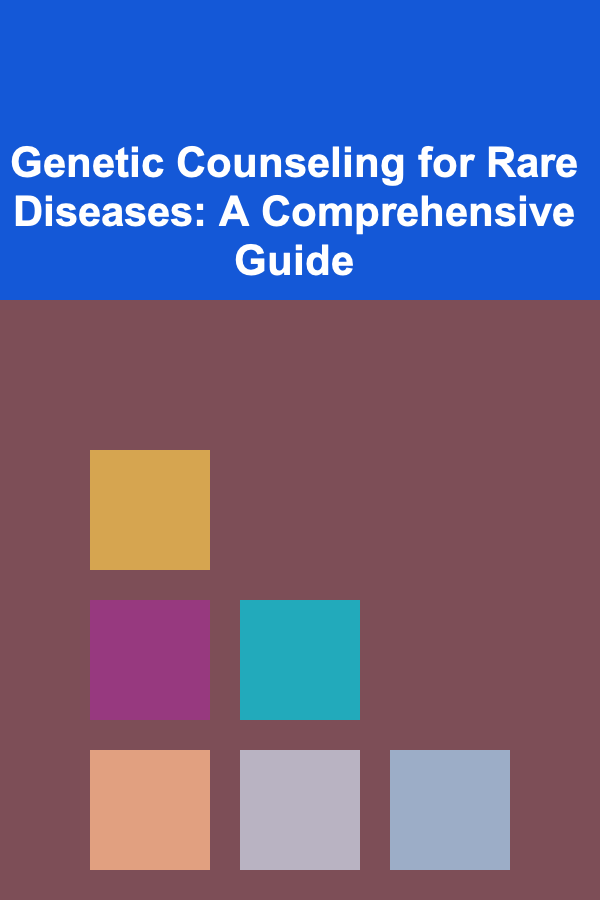
Genetic Counseling for Rare Diseases: A Comprehensive Guide
ebook include PDF & Audio bundle (Micro Guide)
$12.99$11.99
Limited Time Offer! Order within the next:

Genetic counseling is an essential service for individuals and families dealing with genetic disorders, particularly rare diseases. Rare diseases, which are often inherited and occur in a small percentage of the population, can be challenging not only because of the physical and medical challenges they pose but also due to the emotional, social, and financial implications. In these instances, genetic counseling becomes a crucial tool for understanding the condition, assessing risks, and providing support for individuals and families navigating these complexities.
This article aims to provide a comprehensive guide to genetic counseling for rare diseases, covering the role of genetic counselors, the process of genetic testing, the ethical and emotional aspects, and the challenges specific to rare conditions. By exploring these aspects, we can gain a clearer understanding of how genetic counseling plays an instrumental role in the management and understanding of rare diseases.
What is Genetic Counseling?
Genetic counseling is a communication process that involves educating individuals or families about the genetic aspects of diseases and disorders, especially in the context of inheritance. It involves the integration of genetic information with medical, psychological, and ethical considerations to help individuals make informed decisions about their health.
Genetic counselors are trained professionals who assess risk factors, explain complex genetic concepts, interpret genetic testing results, and provide guidance on options for managing and preventing inherited conditions. They work closely with individuals and families to help them understand the implications of genetic conditions and diseases, such as rare genetic disorders.
Why is Genetic Counseling Important for Rare Diseases?
The importance of genetic counseling in rare diseases cannot be overstated. Rare diseases are often poorly understood by the general public and medical professionals, making it difficult to diagnose and treat these conditions effectively. In many cases, individuals with rare diseases face a long and often frustrating journey to find a diagnosis, let alone a treatment plan.
- Accurate Diagnosis: Rare diseases often have symptoms that overlap with other more common conditions. Genetic counseling helps individuals understand the potential genetic causes of their symptoms, enabling a more accurate diagnosis.
- Risk Assessment: For families with a history of a rare genetic disorder, genetic counseling is essential to assess the risk of passing the condition to future generations.
- Understanding Prognosis: With rare diseases, especially those with little research, understanding the progression and long-term effects of a disease can be difficult. Genetic counselors can provide information based on available data and research on the condition.
- Support and Coping: Genetic counselors offer emotional support, as dealing with a rare disease can be overwhelming. They provide coping strategies for both the patient and their family members, ensuring that families feel supported throughout the diagnostic and treatment process.
The Genetic Counseling Process for Rare Diseases
Genetic counseling for rare diseases typically follows a structured process. It involves multiple steps, from gathering detailed medical histories to offering recommendations for genetic testing, and providing psychological and emotional support. Here's an in-depth look at what the genetic counseling process entails:
1. Pre-Counseling: Collecting Medical History
The first step in genetic counseling involves gathering comprehensive information about the patient's medical and family history. This allows genetic counselors to understand the potential risks and patterns of inheritance. Information gathered includes:
- Family History: This is crucial in rare diseases, as many rare conditions are inherited in specific patterns (e.g., autosomal dominant, autosomal recessive, X-linked).
- Medical History: Genetic counselors will ask about any past diagnoses, symptoms, and medical treatments. This is especially important for identifying any symptoms that might indicate a rare genetic disorder.
- Ethnicity and Geographic Background: Certain rare diseases are more prevalent in specific ethnic or geographic populations, so this information can help counselors better understand the likelihood of a particular condition.
The genetic counselor will also explore any previous genetic testing the individual or family members may have undergone, and whether a diagnosis has already been made or if further testing is needed.
2. Risk Assessment and Education
Once the medical and family histories have been reviewed, the next step is risk assessment. Genetic counselors will use this information to estimate the likelihood of the individual or their family members having or passing on a rare genetic condition.
Genetic counselors will educate patients about:
- Inheritance Patterns: Understanding how a genetic disease might be passed down within a family. For example, a counselor will explain whether the disease is recessive, dominant, or X-linked.
- Genetic Testing: Genetic counselors provide detailed information on available genetic tests that could help identify the presence of a rare genetic disorder. This may include sequencing entire genomes or specific genes known to be linked with rare diseases.
- Pre-Testing Counseling: Before genetic testing is performed, counselors ensure that patients fully understand the implications of the tests. This includes explaining the accuracy, potential outcomes, and limitations of the tests.
This stage is essential because it allows the patient or family to make an informed decision about genetic testing based on their understanding of the risks and benefits.
3. Genetic Testing
Genetic testing is often a crucial step in confirming or ruling out a diagnosis for a rare disease. The process involves analyzing an individual's DNA for mutations or variations that could indicate a genetic disorder.
- Types of Genetic Testing: Depending on the suspected rare disease, different types of genetic tests may be conducted. This could involve testing specific genes known to be associated with certain conditions or more comprehensive testing like whole-exome or whole-genome sequencing.
- Accuracy of Testing: For rare diseases, the accuracy of genetic tests can vary. In some cases, tests may identify a mutation linked to the disease, while in other cases, results may be inconclusive. Genetic counselors play a key role in explaining these outcomes to patients and helping them understand what the results mean.
The genetic test results may confirm a diagnosis, help understand the severity of the disease, or provide information about potential treatments or interventions. However, it's important to remember that for some rare diseases, genetic testing may not always offer conclusive answers due to the complexity and evolving nature of genetic research.
4. Post-Test Counseling
Once genetic test results are available, the genetic counselor helps the patient or family understand the implications of the results. In the case of rare diseases, this step can be emotionally charged because the results may be life-altering or indicate an unknown genetic condition.
- Positive Results: If a genetic test confirms the presence of a rare genetic disease or a predisposition to a disease, the counselor will provide support by explaining what the diagnosis means, including the potential symptoms, prognosis, and treatment options.
- Negative Results: If the test results are negative, genetic counselors will discuss the limitations of the testing and the possibility that the disease may still be present but not detectable by the test.
- Uncertain Results: In some cases, the test results may be inconclusive or reveal a mutation of unknown significance. The genetic counselor will explain these results and may recommend further testing or monitoring.
Post-test counseling is an important part of the process because it helps patients and families process complex information and plan for the next steps, whether it involves treatment, monitoring, or further testing.
5. Psychological Support
Dealing with a rare disease diagnosis can be overwhelming. The uncertainty about the future, the potential for long-term health issues, and the emotional burden can be significant. Genetic counselors are trained to provide emotional support and help individuals and families cope with these challenges.
- Coping Strategies: Counselors provide patients and their families with strategies for coping with the stress and emotional challenges associated with a rare disease diagnosis.
- Family Dynamics: Rare diseases often have implications for the entire family, particularly if the condition is genetic. Genetic counselors help families understand how to communicate about the diagnosis and navigate complex family dynamics.
- Support Resources: In addition to counseling, genetic counselors may refer patients and families to support groups, mental health professionals, or organizations dedicated to specific rare diseases.
6. Decision-Making Support
Genetic counseling plays a pivotal role in helping individuals make informed decisions. Whether it's deciding to undergo genetic testing, preparing for potential pregnancy, or considering treatment options, the counselor helps patients understand the pros and cons of each decision. The process involves providing comprehensive, unbiased information so that individuals can make decisions that align with their values, goals, and circumstances.
Challenges in Genetic Counseling for Rare Diseases
Genetic counseling for rare diseases presents unique challenges. These include the limited availability of research and treatment options, the difficulty of making accurate diagnoses, and the emotional strain on families.
1. Limited Research and Treatment Options
Many rare diseases are understudied, and effective treatments are often lacking. This poses a challenge for genetic counselors, as they may not be able to provide patients with concrete treatment options or long-term prognosis. However, genetic counselors can help patients explore experimental therapies or clinical trials that may offer hope.
2. Complex Inheritance Patterns
Rare diseases often have complicated inheritance patterns that can be difficult to predict. This complexity can make it challenging for genetic counselors to provide clear, definitive answers about risks for future generations. In some cases, the exact genetic cause of a disease may not be known, further complicating the situation.
3. Emotional Impact
The emotional impact of rare diseases can be profound. Many families experience feelings of isolation, guilt, or hopelessness. Providing psychological support and helping families adjust to the diagnosis is a critical part of the genetic counseling process.
4. Ethical and Social Issues
Genetic counseling often involves ethical considerations, particularly regarding the implications of genetic testing. Decisions about whether or not to undergo testing, what to do with the information obtained, and how to share it with family members can raise significant ethical questions. Genetic counselors must be equipped to help patients navigate these issues, ensuring that their decisions align with their values and beliefs.
Conclusion
Genetic counseling plays a vital role in helping individuals and families understand and manage rare genetic diseases. Through detailed assessments, education, testing, emotional support, and decision-making assistance, genetic counselors help individuals navigate the complexities of rare diseases. Despite the challenges posed by the rarity and complexity of these conditions, genetic counseling offers a crucial resource for those affected by rare genetic disorders. By providing the necessary tools to cope with and understand these conditions, genetic counselors help families make informed decisions and improve their quality of life.
Reading More From Our Other Websites
- [Metal Stamping Tip 101] Speed, Precision, and Cost-Efficiency: The Key Advantages of Metal Stamping for Mass Manufacturing
- [Home Pet Care 101] How to Teach Your Pet Basic Commands for Better Behavior
- [Home Security 101] How to Maximize the Effectiveness of Your Home Security Camera Field of View
- [Home Lighting 101] How to Brighten Dark Rooms with Creative Lighting Solutions
- [Organization Tip 101] What Steps Can You Take to Organize Your Dining Area?
- [Toy Making Tip 101] DIY Playtime: Crafting Perfect Toys Together with Your Best Friend
- [Home Budget 101] How to Create a Home Budget That Works: Tailoring Your Plan
- [Trail Running Tip 101] Hydration & Nutrition Hacks for Human‑Dog Trail Running Duos
- [Personal Care Tips 101] How to Apply Shaving Cream for a Comfortable Shave
- [Skydiving Tip 101] Choosing the Perfect Skydiving Jumpsuit: Materials, Fit, and Safety Features

How to Create a Financial Vision Board for Your Goals
Read More
How to Organize Your Closet for Quick Seasonal Changes
Read More
How to Use Financial Literacy Resources for Better Budgeting
Read More
Why One-Page Websites Are Ideal for Digital Portfolios and Creative Professionals
Read More
How to Develop Space-Based Tourism
Read More
How to Create a Family To-Do List for Homeschooling Success
Read MoreOther Products

How to Create a Financial Vision Board for Your Goals
Read More
How to Organize Your Closet for Quick Seasonal Changes
Read More
How to Use Financial Literacy Resources for Better Budgeting
Read More
Why One-Page Websites Are Ideal for Digital Portfolios and Creative Professionals
Read More
How to Develop Space-Based Tourism
Read More